#trita parsi
Text


In Philadelphia, PENNSYLVANIA.
So...are we to assume Kamala is intent on picking PA Governor Josh Shapiro? Seems like it by announcing it in Philadelphia. I don't know why else she would announce not in someone's home state.
But picking Shapiro just proves how bad Kamala's political thinking and instincts are.
And also her timing.

— Student protests and Gaza. No issue has divided the Democratic coalition like the war in the Middle East. Shapiro’s strong support for Israel is arguably in line with other top Dems, but critics cite his reluctance to call for a cease-fire in Gaza and in particular his strong stance against pro-Palestinian student demonstrators, using his platform to urge Penn to shut down its protest encampment and even seeming to compare pro-Palestinian activists to “white supremacists” in interviews. But Shapiro has also spoken out against Palestinian civilian casualties, and his supporters say activists’ focus on the one VP finalist who is Jewish smacks of antisemitism.
— Handling of sexual harassment. The Shapiro administration last year agreed to pay $295,000 to a former female aide who accused a long-time political associate of the governor — Mike Vereb, his legislative secretary, a cabinet post — of making unwanted sexual advances and frequent lewd talk. Female lawmakers in both parties have criticized the administration — which cites a non-disclosure agreement for not talking about the case — for an alleged lack of transparency. The Democratic candidate for state treasurer — political outsider Erin McClelland — sent shock waves through the veepstakes when she tweeted that she wanted a VP “who doesn’t sweep sexual harassment under the rug.”
This is a hopeful moment for the whole left-liberal coalition. The vibes, for once, are good. Almost every leftist I know is excited about Harris and thinks Trump is beatable. With a newly united party behind her, there are only so many ways Harris can screw it up, but one seems all too plausible: She could select Pennsylvania Governor Josh Shapiro as her running mate.
On paper, it’s understandable why Shapiro is among the leading candidates reportedly being vetted by Harris. Like nearly all of the veep contenders, he’s a white male governor with a centrist reputation. At 51, he’s even younger than Harris and a fresh face, having only held his current job for 18 months. He has already shown himself to be a more than capable administrator, generating a lot of good publicity for repairing a damaged section of Interstate 95 within two weeks. Most importantly, Pennsylvania is the most valuable swing state in play, worth 19 electoral votes, and Shapiro is very popular there.
Unfortunately, Shapiro also stands out among the current field of potential running mates as being egregiously bad on Palestine. It’s not just that he, like many Democrats, is an outspoken supporter of Israel—though he certainly is, having championed Israel’s war against Hamas consistently and without any apparent concern for Palestinian civilians. Shapiro has, moreover, done far more than most Democrats to attack pro-Palestine antiwar demonstrators, in ways that call into question his basic commitment to First Amendment rights.
In his previous role as Pennsylvania attorney general, Shapiro championed the state’s constitutionally dubious anti-BDS (boycott, divestment, sanctions) law against Ben & Jerry’s after the ice cream maker refused to license its product for sale in Israeli settlements. “BDS is rooted in antisemitism,” Shapiro wrote in a statement in 2021, as he condemned a company named for its two Jewish American founders. “The stated goal of this amorphous movement is the removal of Jewish citizens from the region and I strongly oppose their efforts.”
[...]
CNN’s John King has already flagged that antisemitism might make the selection of a Jewish vice presidential candidate risky; likewise, calls from the left to oppose Shapiro risk being branded as antisemitic. Shapiro is not, however, the only Jew who has been suggested as a possible running mate for Harris. Illinois Governor J.B. Pritzker has also garnered attention, and he has taken a very different approach to this issue. Asked by the Illinois state politics site Capitol Fax whether he agreed with Jewish organizations calling for the resignation of Northwestern University’s president over a pro-Palestine encampment, Pritzker replied, “I support the Jewish organizations. I’m not about calling for people to step down.” He also drew a distinction between antiwar, pro-Palestinian demonstrators and “some bad actors” engaged in antisemitism, and affirmed the need to protect free speech along with student safety.
Most other candidates floated for the V.P. spot have also taken a far less provocative approach to student protests than Shapiro (one partial exception is Arizona Senator Mark Kelly, who endorsed some GOP smears of campus protesters in an interview, though he hasn’t shown Shapiro’s same level of fixation). North Carolina Governor Roy Cooper actually drew criticism for making no public statement about an encampment at the University of North Carolina. Wisconsin Governor Tony Evers said that encampments at the University of Wisconsin were “in good faith,” even as he acknowledged they would eventually need to end. Neither Kentucky’s Andy Beshear nor Minnesota’s Tim Walz made any public statements about similar demonstrations in their states.
[...]
Still, his particular hostility toward pro-Palestine activists threatens to blunt the enthusiasm among young progressive voters that Harris has managed to generate in the past few days. It could also undermine the Democratic ticket in Michigan, where Arab American activists have cheered the news of Biden’s withdrawal and are adopting a wait-and-see posture toward Harris. Michigan Representative Rashida Tlaib, the lone Palestinian American in Congress, is currently holding off on endorsing Harris but has expressed interest in engaging with her on ending the war in Gaza.
Beyond Arab and Muslim Americans, Harris will need to mobilize thousands of young people across the country not only to vote for her but to knock doors, phone bank, and do all the other kinds of grassroots volunteering that translates into a successful presidential campaign. Younger Americans disproportionately sympathize with Palestinians, which is one reason Biden’s approval numbers have suffered badly over the past year. As long as U.S.-made bombs keep falling on Gaza, this issue won’t go away—protests will haunt the Democratic convention in Chicago next month and the beginning of the fall term on college campuses in September, and the anniversary of the attacks on October 7 will fall 29 days before Election Day.
And what happened recently? Oh, Israel decided to assassinate someone on Iranian territory, pretty close to the new Iranian president.
youtube
And we can all tell that a bigger war is coming in the Middle East because the airlines are starting to cancel flights.
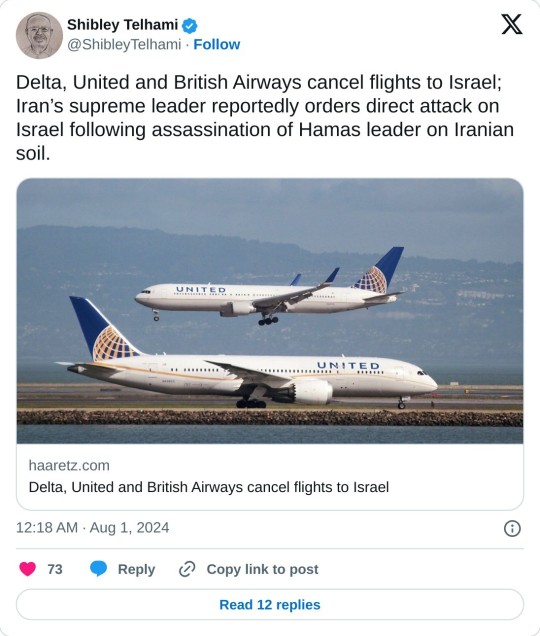
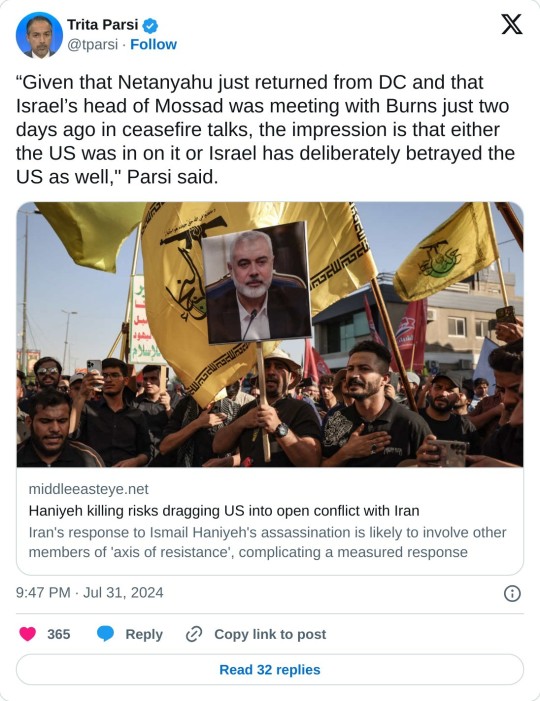


So... when is the next attack going to happen? Wouldn't surprise me if it happens next week after Kamala announces her VP pick.
That would be just her luck.
Because let's not forget that Israel is trying to drag the US military directly into this. They can't fight Hezbollah on their own.
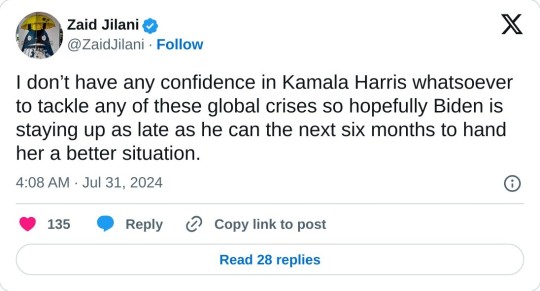


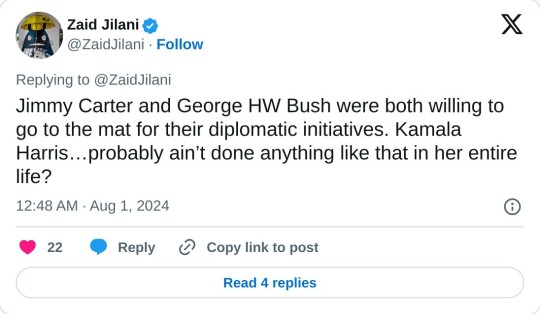


#my gif#election 2024#USA#politics#democratic party#kamala harris#israel#palestine#iran#josh shapiro#lebanon#joe biden#breaking points#krystal ball#trita parsi#twitter#will bunch#Youtube#zaid jilani
21 notes
·
View notes
Text

I mean...we know
Who's gonna do anything about it? That's the problem.
#free gaza#free palestine#gaza strip#irish solidarity with palestine#palestine#gaza#news on gaza#al jazeera#boycott israel#israel#Biden#joe biden#Trita Parsi#Quincy Institute
30 notes
·
View notes
Text
Members of Congress from both sides of the aisle tonight are lambasting the Biden administration for not getting Congressional approval before moving ahead with military strikes against Houthi targets in Yemen.[...]
“The President needs to come to Congress before launching a strike against the Houthis in Yemen and involving us in another middle east conflict. That is Article I of the Constitution. I will stand up for that regardless of whether a Democrat or Republican is in the White House,” posted California Democratic Rep. Ro Khanna on X, just as news was breaking that the strikes were in progress. Some 30 minutes earlier, there were reports that Congressional leaders were given a heads up that the strikes were a go.
“Only Congress has the power to declare war,” posted Kentucky Republican Rep. Thomas Massie. “I have to give credit to @RepRoKhanna here for sticking to his principles, as very few are willing to make this statement while their party is in the White House.”[...]
“@POTUS is violating Article I of the Constitution by carrying out airstrikes in Yemen without congressional approval,” charged Michigan Democrat Rashida Tlaib. “The American people are tired of endless war.” Democratic Reps. Cori Bush, Val Hoyle, Mark Pocan, and Pramila Jayapal weighed in similarly as of 9 p.m. tonight.
On the Republican side, Sen. Mike Lee, who has often crossed the aisle on war powers issues, also gave Khanna a boost. “The Constitution matters, regardless of party affiliation.”
"The Constitution is clear, only Congress has the power to declare war. President Biden must come to Congress and ask us to authorize this act of war," posted Florida Republican Rep. Anna Luna.[...]
“These attacks have endangered U.S. personnel, civilian mariners, and our partners, jeopardized trade, and threatened freedom of navigation,” Biden said. “I will not hesitate to direct further measures to protect our people and the free flow of international commerce as necessary.”
The Houthis have said they would continue the attacks until “crimes in Gaza stop and food, medicines and fuel are allowed to reach its besieged population.” The Biden administration, which has not supported a ceasefire in Gaza, said it would hit back hard if the Houthis did not stand down. After a particularly heavy volley of drones and rockets on Tuesday, the administration made its move.
This has a lot of analysts worried about escalation — something the Biden administration said it didn't want. "If the objective is to stop Houthi attacks without escalating matters toward a full war, then bombing them has proven quite inefficient in the past. Just ask the the Saudis," said the Quincy Institute's Trita Parsi, on X, referring to the Yemen civil war in which the Houthis gained major victories despite routine missile bombardments from U.S.-backed Saudi Arabia.
"Moreover, bombing them very likely will escalate matters, which means that not only will the attacks not be stopped, but the broader war that Biden [allegedly] seeks to prevent will likely become a reality."
12 Jan 24
#quincy's hit & miss but theyve got some strong authors#vlahos here's also a good follow#at least far above average#picture here's also from akrotiri
2K notes
·
View notes
Text

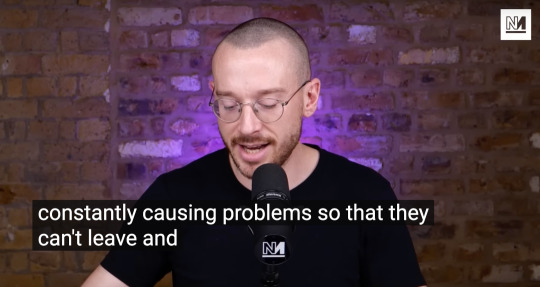
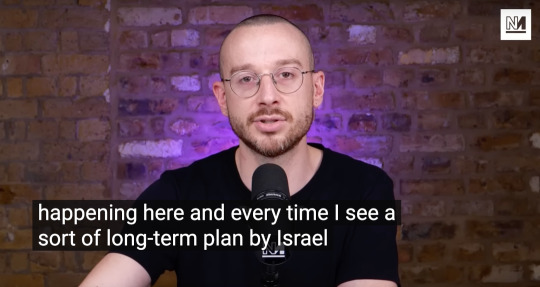

"I listen to lots of these geopolitics podcasts. They're always decrying the fact that every US President says they want to pivot to Asia.
They see the principal rival to the United States as China. So they want to pivot their military resources, their economic might, to that region.
But they keep getting drawn back into the Middle East, which is not as strategic as it used to be, partly because America has shale gas, they don't rely on Middle Eastern oil in the same way that they used to.
So they want to stay out of the Middle East, but they keep getting drawn back into it because stuff keeps happening.
Trita Parsi said to me that this is not an accident. Israel's biggest fear is the fear of abandonment.
That America basically says: "look, you're kind of on your own, we don't have the military resources to expand here, we are going and focusing on East Asia".
And the way Israel says: "remember us, come back!", is to constantly create problems.
If you're constantly creating tensions with Lebanon, with Iran, and making completely unrealistic situations like this plan for Gaza, then you are telling America to come back.
So it's almost this sort of somewhat abusive relationship, where you're constantly causing problems so that they can't leave.
And that seems to be what's happening here.
Every time I see a long-term plan by Israel, it seems in a way that chaos is part of the plan."
26 notes
·
View notes
Text
The international rules-based order and international law have always been aspirational fictions. While these systems served the West, as evidenced by the ICC primarily going after leaders in the Global South, there was still a hope of something more, of a real international community that worked together to hold despots and perpetrators of the world’s great horrors to account. But then these international courts took their most recent steps. The ICJ has started ruling against Israel, the ICC issued arrest warrants for Netanyahu and Gallant. And the U.S. responded not by adhering to these rulings, but by blowing up the shared fiction, by blowing up the very idea that we can have real and meaningful international law. It is as it ever was. As long as the U.S. is the most powerful entity on Earth there will be no force greater, no entity able to check this country or its allies. No matter the crime, if it aligns with U.S. interests no law can punish it. Or at least that’s the world the United States aims for.
So we find ourselves on the edge of a new world order, a new international system where the interests of the U.S. do not dominate. We’re not quite there, but the insistence on protecting Israel from any consequences for its genocidal actions is accelerating the arrival of that day. In the process we are getting the breakdown of the shared fiction of international law. That fiction was never what it could be, what we should aim for, which is the real ability to hold war criminals to account and stop rogue nations hellbent on slaughter, but the fact that it is now able to deal powerful symbolic blows to U.S. imperial interests has doomed it to having the reality of its weakness exposed before the world, as the U.S. empire accelerates its own downfall rather than halting the genocide of its junior partner. As expert Trita Parsi says, “When the Biden administration is talking about a 'rules-based order', it is talking about an order in which the US rules; not an order based on rules.” In many ways it appears that this is the order which is now coming to an end. And on the gravestone of this era may well be written “Sacrificed it all to defend a genocide.” Or, at the least, the note will be etched on one of the nails in the coffin.
11 notes
·
View notes
Text
By Jake Johnson
Common Dreams
July 31, 2024
"Netanyahu isn't playing chicken, he wants to crash the car," said one observer.
The political leader of Hamas was assassinated early Wednesday in what the group said was an Israeli attack on his residence in the Iranian capital of Tehran, which he was visiting to attend the inauguration of the country's newly elected president.
The killing of Ismail Haniyeh, who became the head of Hamas' political arm in 2017, sparked warnings that Israeli Prime Minister Benjamin Netanyahu is doing all he can to undermine cease-fire talks with the Palestinian group after they showed signs of progress in recent weeks.
"Netanyahu has systematically sabotaged cease-fire talks because ending the war will likely end his political career," Trita Parsi, executive vice president of the Quincy Institute for Responsible Statecraft, said following the assassination of Haniyeh, a key figure in the negotiations.
"The assassination buys Netanyahu several weeks, if not months, in which there will be no serious expectation of a cease-fire deal," Parsi argued. "Thus, the war will continue, as will Netanyahu's reign as prime minister."
Haniyeh's killing prompted fury from Iran, whose supreme leader vowed a "harsh response"—heightening the chances of a long-feared all-out war between Israel and Iran. Earlier this year, Israel killed several Iranian commanders in a strike on Tehran's consulate in Syria's capital, prompting Iran to retaliate with a drone attack.
Iranian lawmakers are expected to hold an emergency meeting about Haniyeh's assassination later Wednesday. As of this writing, the Israel Defense Forces (IDF) has yet to comment on the killing.
The International Criminal Court's (ICC) top prosecutor, Karim Khan, was seeking an arrest warrant against Haniyeh for war crimes committed on October 7. Khan has also applied for an arrest warrant against Netanyahu and Israeli Defense Minister Yoav Gallant.
"How can mediation succeed when one party assassinates the negotiator on the other side?"
The suspected Israeli strike in Tehran on Wednesday was launched just hours after Israel's military bombed the Lebanese capital of Beirut, killing several people—including two children—in retaliation for a deadly attack on the occupied Golan Heights. Israel claimed its attack on Beirut killed Hezbollah commander Fouad Shukur, but subsequent reporting suggested he may have survived the strike.
News of Haniyeh's assassination in Tehran came days after top officials from Israel, Egypt, Qatar, and the United States met in Rome over the weekend to continue negotiating a possible deal to end Israel's assault on the Gaza Strip.
The New York Timesreported that "despite progress in recent weeks, the monthslong negotiations remain stalled over several critical issues, particularly the extent to which Israeli forces would remain in Gaza during a truce."
"Earlier in July, Israel hardened its position on maintaining checkpoints along a strategic highway south of Gaza City, weeks after suggesting that it could compromise," the Times added. "It was unclear on Sunday if Mr. Netanyahu had allowed negotiators to show greater flexibility on the matter during the talks. Mr. Netanyahu faces pressure from members of his right-wing government to stick to a tougher line. The length of the truce is also a source of dispute: Hamas wants a permanent truce, while Israel wants the option to resume fighting."
Egypt said Haniyeh's killing is a signal from Israel that it lacks "political will for deescalation," according toAl Jazeera.
Qatar's prime minister, meanwhile, wrote on social media: "Political assassinations and continued targeting of civilians in Gaza while talks continue leads us to ask, how can mediation succeed when one party assassinates the negotiator on the other side?"
Jamal Abdi, president of the National Iranian American Council, warned that with the assassination of Haniyeh, "Netanyahu isn't playing chicken, he wants to crash the car."
U.S. Secretary of State Antony Blinken said Wednesday that the United States was "not aware of or involved in" the assassination of Haniyeh.
Belén Fernández, a contributing editor at Jacobin, wrote in an op-ed for Al Jazeera that "Israel made its intention to continue and expand the war clear" by killing Haniyeh.
"By assassinating Haniyeh in Tehran, Israel is literally playing with fire," Fernández wrote. "In order to derail cease-fire prospects and keep up the killing in Gaza, then, it seems Israel is going to end up with a whole lot more regional blood on its hands."
This story has been updated to include new comment from U.S. Secretary of State Antony Blinken.
Our work is licensed under Creative Commons (CC BY-NC-ND 3.0). Feel free to republish and share widely.
10 notes
·
View notes
Text
Emory University economics professor Caroline Fohlin approached several police officers who were holding a student down on the ground on Thursday and demanded an explanation—but by the end of the day videos of her own arrest became some of the most widely circulated images of the rapidly spreading anti-war movement on college campuses across the U.S.
As she knelt down to ask the university officers, "What are you doing?" another law enforcement agent grabbed her arm and pushed her away before repeatedly ordering her to "get on the ground."
"Stop it!" Fohlin yelled before the officer pushed her to the ground and called for more police to help subdue her.
Fohlin then screamed, "Oh my God!" as the police pushed her down and told the police that she was a professor at the university as they held her on the ground.
Fohlin's arrest—after which she was detained for 11 hours and then charged with "battery of a police officer"—came a week after Columbia University suspended more than 100 students for setting up an encampment in solidarity with Gaza, where more than 34,000 Palestinians have been killed by the U.S.-backed Israel Defense Forces (IDF) since October, and allowed police to arrest them. The mass arrests only served to galvanize students and faculty at Columbia and at dozens of other schools, with more than 400 peoplebeing detained so far.
The American Association of University Professors called the arrest "antithetical to the mission of higher education."
"Our institutions exist to foster robust exchanges of ideas and open dialogue in service of knowledge and understanding," said the group. "Sometimes that includes open dissent. Peaceful campus protests should never be met with violence."
Foreign policy expert Trita Parsi suggested that Fohlin's arrest was among the on-campus incidents that have strained the Democratic Party's argument that "democracy is on the ballot in November."
"To sustain this level of blind support for Israel, the U.S. must erode its own democracy. And that is what we see happening on U.S. campuses now," said Parsi, executive vice president of the Quincy Institute for Responsible Statecraft, sharing a video of police tasing an Emory student who was already being held down on the ground.
#emory university#Carolin fohlin#student protest#university protests#college protests#palestine#israel#us politics#police brutality#Note the absolutely false charges
10 notes
·
View notes
Text
Keep an eye on this. Other possible steps forward in the past have been walked back.
h/t to Trita Parsi
7 notes
·
View notes
Text
As Israelis and Palestinians mourn the dead and fearfully await news of those now missing, the tendency to look for someone to blame is impossible for many to resist. Israelis and their supporters want to pin all the blame on Hamas, whose direct responsibility for the horrific attack on Israeli civilians is beyond question. Those more sympathetic to the Palestinian cause see the tragedy as the inevitable result of decades of occupation and Israel’s harsh and prolonged treatment of its Palestinian subjects.
Others insist there is plenty of blame to go around, and that anyone who sees one side as wholly innocent and the other as solely responsible has lost any capacity for fair-minded judgment.
Inevitably, arguing over which of the immediate protagonists is most at fault obscures other important causes that are only loosely related to the long conflict between Zionist Israelis and Palestinian Arabs. We should not lose sight of these other factors even during the present crisis, however, because their effects may continue to echo long after the current fighting stops.
Where one begins to trace causes is inherently arbitrary (Theodor Herzl’s 1896 book, The Jewish State? the 1917 Balfour Declaration? the Arab revolt of 1936? the 1947 U.N. partition plan? the 1948 Arab-Israeli war, or the 1967 Six-Day War?), but I’ll start in 1991, when the United States emerged as the unchallenged external power in Middle East affairs and began trying to construct a regional order that served its interests.
Within that broader context, there are at least five key episodes or elements that helped bring us to the tragic events of the past two weeks.
The first moment was the 1991 Gulf War and its aftermath: the Madrid peace conference. The Gulf War was a stunning display of U.S. military power and diplomatic artistry that removed the threat that Saddam Hussein had posed to the regional balance of power. With the Soviet Union nearing collapse, the United States was now firmly in the driver’s seat. Then- President George H. W. Bush, Secretary of State James Baker, and an experienced Middle East team seized upon this opportunity to convene a peace conference in October 1991, which included representatives from Israel, Syria, Lebanon, Egypt, the European Economic Community, and a joint Jordanian/Palestinian delegation.
Although the conference did not produce tangible results—let alone a final peace agreement—it laid the groundwork for a serious effort to construct a peaceful regional order. It is tantalizing to contemplate what might have been achieved if Bush had been reelected in 1992 and his team had been given the opportunity to continue their work.
Yet Madrid also contained a fateful flaw, one that sowed the seeds of much future trouble. Iran was not invited to participate in the conference, and it responded to being excluded by organizing a meeting of “rejectionist” forces and reaching out to Palestinian groups—including Hamas and Islamic Jihad—that it had previously ignored. As Trita Parsi observes in his book Treacherous Alliance, “Iran viewed itself as a major regional power and expected a seat at the table,” because Madrid was “not seen as just a conference on the Israeli-Palestinian conflict, but as the defining moment in forming the new Middle East order.” Tehran’s response to Madrid was primarily strategic rather than ideological: It sought to demonstrate to the United States and others that it could derail their efforts to create a new regional order if its interests were not taken into account.
And that is precisely what happened, as suicide bombings and other acts of extremist violence disrupted the Oslo Accords negotiation process and undermined Israeli support for a negotiated settlement. Over time, as peace remained elusive and relations between Iran and the West deteriorated further, the ties between Hamas and Iran grew stronger.
The second critical event was the fateful combination of the Sept. 11, 2001 terrorist attacks and the subsequent U.S. invasion of Iraq in 2003. The decision to invade Iraq was only tangentially related to the Israeli-Palestinian conflict, even though Ba’athist Iraq had backed the Palestinian cause in several ways. The George W. Bush administration believed that toppling Saddam would eliminate the supposed threat of Iraqi weapons of mass destruction, remind adversaries of U.S. power, strike a blow against terrorism more broadly, and pave the way for a radical transformation of the entire Middle East along democratic lines.
What they got, alas, was a costly quagmire in Iraq and a dramatic improvement in Iran’s strategic position. This shift in the balance of power in the Gulf alarmed Saudi Arabia and other Gulf states, and perceptions of a shared threat from Iran began to reshape regional relationships in important ways, including by altering some Arab states’ relations with Israel. Fears of U.S.-led “regime change” also encouraged Iran to pursue a latent nuclear weapons capability, leading to a steady increase in its enrichment capacity and ever-tighter U.S. and U.N. sanctions.
With hindsight, a third key event was then-U.S. President Donald Trump’s fateful abandonment of the 2015 Joint Comprehensive Plan of Action (JCPOA) with Iran and his adoption of a policy of “maximum pressure” instead. This foolish decision had several unfortunate effects: Leaving the JCPOA allowed Iran to restart its nuclear program and move much closer to an actual weapons capability, and the maximum pressure campaign led Iran to attack oil shipments and facilities in the Persian Gulf and Saudi Arabia, to show the United States that its attempt to compel or overthrow them was not without costs and risks.
As one would expect, these developments heightened the concerns of the Saudis and increased their interest in acquiring nuclear infrastructure of their own. And as realist theory predicts, perceptions of a growing threat from Iran encouraged quiet but significant forms of security cooperation between Israel and several Gulf states.
The fourth development was the so-called Abraham Accords, in some ways a logical extension of Trump’s decision to leave the JCPOA. The brainchild of amateur strategist (and Trump’s son-in-law) Jared Kushner, the accords were a series of bilateral agreements normalizing relations between Israel and Morocco, Bahrain, the United Arab Emirates, and Sudan. Critics noted that the accords did relatively little to advance the cause of peace because none of the participating Arab governments were actively hostile to Israel or capable of harming it. Others warned that regional peace would remain elusive as long as the fate of the 7 million Palestinians living under Israeli control was unresolved.
The Biden administration continued along much the same path. It took no meaningful steps to stop Israel’s increasingly far-right government from backing violent actions by extremist settlers, which led to a surge in Palestinian deaths and displacements over the past two years. After failing to fulfill a campaign promise to immediately rejoin the JCPOA, Biden and Co. focused their main efforts on persuading Saudi Arabia to normalize relations with Israel in exchange for some sort of U.S. security guarantee and perhaps access to advanced nuclear technology.
The motivation for this effort had little to do with Israel-Palestine, however, and was mostly intended to keep Saudi Arabia from moving closer to China. Linking a security commitment to Saudi Arabia with normalization was primarily a way to overcome U.S. congressional reluctance to a sweetheart deal with Riyadh. Like Israeli Prime Minister Benjamin Netanyahu and his cabinet, top U.S. officials appear to have assumed that there was nothing that any Palestinian group could do to derail or slow this process or draw attention back to their plight.
Unfortunately, the rumored deal gave Hamas a powerful incentive to show just how wrong this assumption was. Recognizing this fact in no way justifies what Hamas did and especially the intentional brutality of the attacks; it is simply to acknowledge that Hamas’s decision to do something—and especially its timing—was a response to regional developments that were driven to a considerable extent by other concerns.
As I noted in my last column, the fifth factor is not a single event but rather the United States’ enduring failure to bring the so-called peace process to a successful end. Washington had monopolized stewardship of the peace process ever since the Oslo Accords (which, as the name implies, came about due to Norwegian mediation), and its various efforts over the years ultimately led nowhere. Former U.S. Presidents Bill Clinton, George W. Bush, and Barack Obama repeatedly declared that the United States—the world’s most powerful country in the full flush of its so-called unipolar moment—was committed to achieving a two-state solution, but that outcome is now farther away than ever and probably impossible.
These background elements are important because the nature of the future global order is up for grabs, and several influential states are challenging the intermittently liberal and inconsistently followed “rules-based order” that the United States has championed for decades. China, Russia, India, South Africa, Brazil, Iran, and others openly call for a more multipolar order, where power is more evenly shared. They want to see a world where the United States no longer acts as the so-called indispensable power, as one that expects others to follow its rules while reserving the right to disregard them whenever they prove inconvenient.
Unfortunately for the United States, the five events I just described and their impact on the region provide potent ammunition for the revisionist position (as Russian President Vladimir Putin was quick to point out last week). “Just look at the Middle East,” they might say. “The United States has been managing the region by itself for more than three decades, and what has its ‘leadership’ produced? We see devastating wars in Iraq, Syria, Sudan, and Yemen. Lebanon is on life support, there is anarchy in Libya, and Egypt is lurching toward collapse. Terrorist groups have morphed and mutated and sown fear on several continents, and Iran keeps edging closer to the bomb. There is no security for Israel and neither security nor justice for the Palestinians. This is what you get when you let Washington run everything, my friends. Whatever their intentions may have been, U.S. leaders have repeatedly shown us that they lack the wisdom and objectivity to deliver positive results, not even for themselves.”
One can easily imagine a Chinese official adding: “May I point out that we have good relations with everyone in the region, and our only vital interest there is reliable access to energy. We are therefore committed to keeping the region quiet and peaceful, which is why we helped Iran and Saudi Arabia reestablish ties last year. Isn’t it obvious that the world would benefit if the U.S. role there declined and ours increased?”
If you don’t think a message like this would resonate outside the comfortable confines of the trans-Atlantic community, then you haven’t been paying attention. And if you are also someone who thinks that addressing the challenge of a rising China is a top priority, you may want to reflect on how the United States’ past actions contributed to the present crisis—and how the shadow of the past will continue to undermine the U.S. standing in the world in the future.
To their credit, over the past week Biden and his foreign-policy team have been doing what they do best, namely, managing a crisis that was at least partly of their own making. They are working overtime to limit the damage, prevent the conflict from spreading, contain the domestic political fallout, and (fingers crossed) bring the violence to an end. We should all hope that their efforts succeed.
But as I noted more than a year ago, the administration’s foreign-policy team are best seen as skilled mechanics but not architects, and in an era where the institutional architecture of world politics is increasingly an issue and new blueprints are needed. They are adept at using the tools of U.S. power and the machinery of government to address short-term problems, but they are stuck in an outdated vision of America’s global role, to include how its handling of its various Middle East clients. It is obvious that they badly misread where the Middle East was headed, and applying Band-Aids today—even if it is being done with energy and skill—will still leave the underlying wounds untreated.
If the end result of Biden and Secretary of State Antony Blinken’s current ministrations is merely a return to the pre-Oct. 7 status quo, I fear that the rest of the world will look on, shake its head in dismay and disapproval, and conclude that it’s time for a different approach.
12 notes
·
View notes
Text
Israel and US deliberately gutting international law in Gaza
Over the past six months in Gaza, Israel has killed civilians on an industrial scale, turned hospitals into strategic military targets and food into a weapon of war.
Blatantly violating basic principles of the laws of war, Israel has deployed the language of international humanitarian law as a form of “humanitarian camouflage,” in the words of independent UN expert Francesca Albanese, in the furtherance of its genocidal campaign.
In her new report titled “Anatomy of a Genocide,” Albanese says that one of her “key findings is that Israel’s executive and military leadership and soldiers have intentionally distorted jus in bello principles, subverting their protective functions, in an attempt to legitimize genocidal violence against the Palestinian people.”
Jus in bello refers to the conditions under which states may legitimately resort to war. It regulates the conduct of parties engaged in an armed conflict.
International humanitarian law, according to the International Committee of the Red Cross, “is synonymous with jus in bello; it seeks to minimize suffering in armed conflicts, notably by protecting and assisting all victims of armed conflict to the greatest extent possible.”
With its genocidal conduct in Gaza, as per analyst Trita Parsi, “Israel is engaged in a deliberate and systematic effort to destroy existing laws and norms around warfare.”
He added, “Israel is seeking to either destroy these norms or create a new normal in which it – much like the US – will be untouchable above these laws and norms.”
This effort was exemplified by Israel’s actions on just one day, 1 April, in Gaza and beyond.
Israel’s forces withdrew from the vicinity of Gaza’s largest and most important hospital after perpetrating what may be one of the worst massacres in Palestinian history; an Israeli attack destroyed the Iranian consulate in Damascus, killing 12, including two Iranian generals; and Israeli personnel killed seven aid workers, including nationals of some of Israel’s closest allies, in central Gaza while they were undertaking an aid mission coordinated with the military.
“Israel is crossing every possible red line, still with full impunity,” Albanese said the following day.
“Sanctions now. Indictments now,” she added.
In the absence of such accountability measures for past and ongoing rights violations, and enabled by decades of impunity, Israel’s total war on Palestinians in Gaza is also a war on the principles of international law, the impact of which will surely be profound.
[keep reading]
3 notes
·
View notes
Text
The International Court of Justice (ICJ) finds Israel is plausibility committing a genocide
Intercept journalist Ryan Grim interviews Trita Parsi about the ruling
.
The ruling should have gone further to demand a ceasefire, but this is still a huge blow to Israel’s global standing and the moral legitimacy of its western enablers. The US and Europe’s claim that they are the guardians of “the rules-based international order” is an utter sham. How will the US vote on the UN Security Council in light of this ruling? My guess: they will continue to unconditionally back Israel and block any attempts to enforce the ruling.
Bless the South Africans who had the spine to stand up for the Palestinians when not even Arab countries in the region would. That act of solidarity literally brought tears to my eyes.
Today is my birthday. All I want is an end to this genocide.
6 notes
·
View notes
Text

The US and its allies have published a joint statement warning Yemen’s Houthis to cease the attacks they’ve been making on commercial vessels in the Red Sea. The Houthis, officially known as Ansarallah, have successfully slashed Israeli port activity by an extremely massive margin with their maritime tactics in response to Israel’s ongoing massacre in Gaza.
The statement asserts that the Yemeni attacks “are a direct threat to the freedom of navigation that serves as the bedrock of global trade in one of the world’s most critical waterways,” complaining that they are “adding significant cost and weeks of delay to the delivery of goods,” and ultimately threatens that the Houthis will “bear the responsibility of the consequences” should these attacks continue.
Many critics have been pointing out the irony of the western power alliance threatening military intervention to protect shipping containers and corporate profits while actual human beings are being butchered by Israeli airstrikes and starved by Israeli siege warfare with nothing but friendly support from these same powers.
“Palestinians would really love to get the same amount of attention and protection as shipping containers,” tweeted Palestinian-Canadian journalist Yasmine El-Sawabi.
That the US and its allies would go to war against the people who are trying to stop an active genocide tells you everything you need to know about them. The fact that they’d do it for corporate profit margins tells you even more, and the fact that they’d do it to a nation they’ve already helped inflict unfathomable horrors upon in recent years tells you more still.
And that’s just one of the potential wars looming on the horizon in connection with the Israeli onslaught in Gaza. As Trita Parsi recently explained in The Nation, there are three other fronts along which wars could also erupt in the region apart from a western conflict with the Houthis: in Iraq and Syria where US forces have been repeatedly under attack by militants in response to the Gaza assault, in Lebanon between Israel and Hezbollah, and the absolute nightmare scenario of a full-scale war with Iran.
“That risk exists on four fronts: Between Israel and the Lebanese Hezbollah, in Syria and Iraq due to attacks on US troops by militias aligned with Iran, the Red Sea between the Houthis and the US Navy, and between Israel and Iran following both the assassination of an Iranian general in Syria and the explosion in Kerman today at the commemoration of the death of General Qassem Soleimani that has killed more than 100,” Parsi writes.
It is a potentially ominous sign that Israel has begun focusing on ramping up aggressions against Iran and Hezbollah while simultaneously withdrawing thousands of troops from Gaza. Some analysts argue that we are seeing an attempt by Israel to pull the US into a direct war with Hezbollah, which is something US officials have reportedly been worried would happen ever since the Gaza assault began.
There are entirely too many fronts along which a new horrific war in the Middle East could potentially erupt, and things are entirely too close to the brink on all of them. And all for land, money and geostrategic control, same as always. The sooner the US-centralized power structure crumbles, the better it will be for humanity.
1 note
·
View note
Video
youtube
Israel Wants to DRAG The US Into a Broader War (w/ Trita Parsi)
0 notes
Text
Mark Wauck
Aug 13, 2024
American Conservative ran an article yesterday that seems timely, coming as it does within a week of the facially goofy claim that Iran “hacked” the Trump campaign and leaked internal communications to Politico. The idea that Iran is seeking to undermine Trump in order to facilitate a continuation of an American regime that is totally under the control of the Anglo-Zionist ruling class—which is currently threatening Iran—doesn’t really pass the laugh test. I take it that the story is not intended to portray Trump as a victim of the a “terrorist” regime, but instead to portray Iran as the eternal enemy of “our democracy”. The damaging leaks to Politico from the Trump campaign—presumably a Deep State job—will be so much gravy to perpetuate the current facade of “our democracy.”
The AmCon article is by Anglo-Zionist bête noire Trita Parsi, and may, in fact, be intended to counter the “hacking” narrative.
How Trump Should Deal with Iran
Iran can make or break Trump’s Middle East withdrawals.
The basic idea of the article is that both Trump and Iran made missteps during the Trump administration. Trump’s first misstep was probably—my view—assuming that Iran wouldn’t pay a lot of attention to his style and rhetoric. The reality is that Iran studies the rest of the world—and especially its adversaries—with an eagle eye, filtered through their own history and culture.
Trump came into office promising to cancel Obama’s Iran deal, calling it, among other things in typical Trumpian style, “the worst deal ever.” Parsi argues that the core of Trump’s objections to the Obama deal had little or nothing to do with Iran’s supposed nuclear ambitions but, rather, had to do with the failure to open Iran to US business:
“They bought 118 Airbus planes, not Boeing planes. They’re spending all of their money in Europe,” he argued in 2016. “It’s so unfair and it’s so incompetent.”
Iran, unused to Trump, took his rhetoric to be threatening. That was in large part due to Trump taking on so many Neocons in his administration—Pompeo and Bolton, in particular. Iran may or may not have misunderstood Trump’s intentions regarding the Obama deal, but they certainly did not misunderstand the intentions of Pompeo and Bolton, and that colored Iranian perceptions of Trump. Trump certainly did well to back out of the attack on Iran, following Iran’s shootdown of our spy drone in their airspace. He had originally been persuaded by Pompeo and Bolton to attack Iran, but reconsidered the craziness of it all:
0 notes
Text
youtube
For Iran, does de-escalation outweigh the cost of escalation?
Aug 12, 2024 #iran#ismailhaniyeh#hamas
Iran’s leaders have pledged “harsh punishment” of Israel after the assassination of Hamas’s political leader, Ismail Haniyeh, in Tehran. But the United States has, in turn, pledged to defend Israel, and Iran is not looking for direct confrontation with Washington. All this indicates a reluctance from Iran to retaliate, argues Trita Parsi, the co-founder of the Quincy Institute for Responsible Statecraft. Parsi tells host Steve Clemons that this is “the most fragile” situation that Iran has faced in years, as Tehran feels pressured to defuse the situation, regardless of looking toothless to its allies.
754 Comments
0 notes
Text
The soul-piercing screams of a mother as her daughter burns to death after Israel bombed her in Gaza.This has gone on for more than 300 days. America provides the bombs, Israel conducts the slaughter.But hey, privately, Biden is getting really tough with Netanyahu… pic.twitter.com/ya3zpoceAu— Trita Parsi (@tparsi) August 4, 2024
0 notes